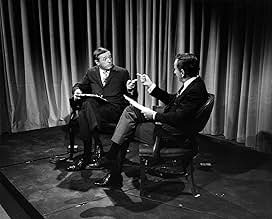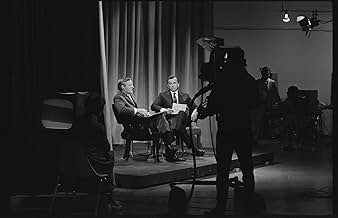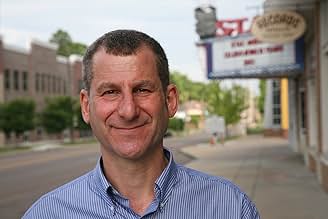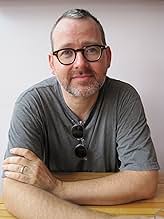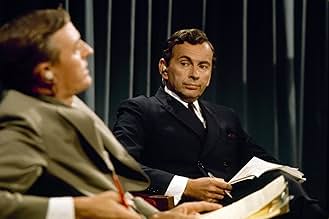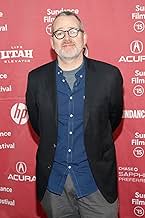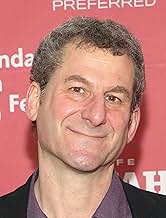IMDb RATING
7.6/10
6.6K
YOUR RATING
A documentary on the series of televised debates in 1968 between liberal Gore Vidal and conservative William F. Buckley.A documentary on the series of televised debates in 1968 between liberal Gore Vidal and conservative William F. Buckley.A documentary on the series of televised debates in 1968 between liberal Gore Vidal and conservative William F. Buckley.
- Directors
- Writers
- Stars
- Awards
- 6 wins & 27 nominations total
Gore Vidal
- Self - Debater
- (archive footage)
William F. Buckley
- Self - Debater
- (archive footage)
Noam Chomsky
- Self
- (archive footage)
Patricia Buckley
- Self - Buckley's Wife
- (archive footage)
Sam Donaldson
- Self - Correspondent, ABC News
- (archive footage)
Howard K. Smith
- Self - Anchor, ABC News
- (archive footage)
- Directors
- Writers
- All cast & crew
- Production, box office & more at IMDbPro
Featured reviews
Best of Enemies is a fascinating documentary film about a series of nationally televised debates in 1968 between two public intellectuals, the liberal Gore Vidal and the conservative William F. Buckley Jr. If that doesn't sound very interesting you couldn't be more wrong. This is a film about two men who absolutely hated each other. Two extremely clever men who fought each other live on television by debating with each that eventually led to personal insults being thrown at each other and it's mesmerising viewing. I have to admit I had never heard of these men before and that's probably because these debates happened a couple of months before I was born but I do know now and I feel much better off for it.
"Best of Enemies" (2015 release; 88 min.) is a documentary about the infamous 10 televised debates that took place during the 1968 Republican and Democratic Presidential Conventions (in Miami and Chicago, respectively), between conservative William Buckley Jr. and liberal Gore Vidal. As the documentary opens, Vidal is commentating about old pictures hanging up in his house and one of them is showing Buckley and Vidal at one of those debates. We then get some background as to who these 2 guys are, and why ABC veered away to bring the "unconventional Convention" coverage. And then we get to the first debate... To tell you more would spoil your viewing experience, you'll just have to see for yourself how it all plays out.
Couple of comments: this documentary is co-directed by Morgan "20 Feet From Stardom" Neville and Robert Gordon, who is affiliated with the Heritage Foundation, a conservative think-tank. If you think that means the documentary is kinder to Buckley that to Vidal, think again. The two men are pitted against each other, and vehemently disdain each other, even before these debates, and much more so afterwards. "It was a confrontation of life styles", as someone comments. Yes, it was, but as it turns out, these debates had another unexpected consequence: ABC's ratings went through the roof, and the other mainstream networks quickly realized they had to have their own versions of these "point-counterpoint" programs. In other words, the Buckley-Vidal debates set into motion what would eventually become the Fox's and MSNBC's news channels. Apart from the historical legacy created by these debates, the documentary also examines the long shadows cast be the debates over the personal lives of both Vidal and (even more so) Buckley. If you have any interest in politics and/or in TV history, you will not want to miss this documentary. It makes for completing viewing, period.
"Best of Enemies" made quite a splash at the Sundance film festival earlier this year. The movie's been out for months and I didn't think it would reach theaters here in Cincinnati, but then out of the blue t showed up this weekend at my local art-house theater here. I figured this would not be playing very long and went to see it right away, The matinée screening where I saw this at turned into a private screening, as in: I literally was the only person in the theater. A shame, as this is a riveting documentary. If you get the chance to see this, be it in the theater, on VOD or eventually on DVD/Blu-ray, do not mist it! "BEst of Enemies" is HIGHLY RECOMMENDED!
Couple of comments: this documentary is co-directed by Morgan "20 Feet From Stardom" Neville and Robert Gordon, who is affiliated with the Heritage Foundation, a conservative think-tank. If you think that means the documentary is kinder to Buckley that to Vidal, think again. The two men are pitted against each other, and vehemently disdain each other, even before these debates, and much more so afterwards. "It was a confrontation of life styles", as someone comments. Yes, it was, but as it turns out, these debates had another unexpected consequence: ABC's ratings went through the roof, and the other mainstream networks quickly realized they had to have their own versions of these "point-counterpoint" programs. In other words, the Buckley-Vidal debates set into motion what would eventually become the Fox's and MSNBC's news channels. Apart from the historical legacy created by these debates, the documentary also examines the long shadows cast be the debates over the personal lives of both Vidal and (even more so) Buckley. If you have any interest in politics and/or in TV history, you will not want to miss this documentary. It makes for completing viewing, period.
"Best of Enemies" made quite a splash at the Sundance film festival earlier this year. The movie's been out for months and I didn't think it would reach theaters here in Cincinnati, but then out of the blue t showed up this weekend at my local art-house theater here. I figured this would not be playing very long and went to see it right away, The matinée screening where I saw this at turned into a private screening, as in: I literally was the only person in the theater. A shame, as this is a riveting documentary. If you get the chance to see this, be it in the theater, on VOD or eventually on DVD/Blu-ray, do not mist it! "BEst of Enemies" is HIGHLY RECOMMENDED!
Turn back the clocks fifty years and we find the birthplace of today's angry, confrontational news programming. In the late sixties, standard operating procedure for network television reporting was straight, impartial, monotone and almost entirely fact-driven. ABC, at the time a very distant third to perennial front-runners NBC and CBS, gambled on rowdy, opinion-driven segments during their convention coverage and won... or did we all lose?
At the heart of it all we find the conservative intellectual, William F. Buckley, and his opponent / counterpoint, the liberal author Gore Vidal, who embark upon a series of fiery debates: one for each night of their respective parties' conventions. In retrospect, their early arguments seem downright civilized - both are eloquent, engaging, brilliant conversationalists and they make for a fascinating contrast - but as the routine bears on and the speakers' attacks grow more personal, the cordiality of their discourse deteriorates. Finally, after slyly baiting his hooks for several such confrontations, one speaker elicits a jolting moment of unguarded, contemptuous rage from his opponent and, knowing his battle won, smugly settles in to enjoy the moment.
It's difficult to get completely behind either man, really. Each spins a mesmerizing oral web, but they also fall into the trap of continually one-upping each other, and that betrays the spirit of the debate. Personally, I'd love to spend a dinner party with either, but wouldn't want to make a habit of it. Deeply interesting historical material that answers many questions about how we arrived at this era of brash 24-hour opinions and endlessly question-dodging presidential debates.
At the heart of it all we find the conservative intellectual, William F. Buckley, and his opponent / counterpoint, the liberal author Gore Vidal, who embark upon a series of fiery debates: one for each night of their respective parties' conventions. In retrospect, their early arguments seem downright civilized - both are eloquent, engaging, brilliant conversationalists and they make for a fascinating contrast - but as the routine bears on and the speakers' attacks grow more personal, the cordiality of their discourse deteriorates. Finally, after slyly baiting his hooks for several such confrontations, one speaker elicits a jolting moment of unguarded, contemptuous rage from his opponent and, knowing his battle won, smugly settles in to enjoy the moment.
It's difficult to get completely behind either man, really. Each spins a mesmerizing oral web, but they also fall into the trap of continually one-upping each other, and that betrays the spirit of the debate. Personally, I'd love to spend a dinner party with either, but wouldn't want to make a habit of it. Deeply interesting historical material that answers many questions about how we arrived at this era of brash 24-hour opinions and endlessly question-dodging presidential debates.
Most people who come to Best of Enemies knows what the state of news media coverage is, especially in the realm of cable news. It's been bad for a long time (there's a very brief excerpt of the time when Jon Stewart called out Crossfire for the very problems that can be seem sprouting up in the film in the end credits). But what's so great about Best of Enemies is how you see that the groundwork laid at the beginning for what's been twisted into the barking (less talking) heads in coverage of the daily events (let alone political conventions) is seen as relatively cordial and sophisticated. Sure, William F. Buckley Jr and Gore Vidal might not be everyone's idea of a good time with a glass of beer (though that depends on what class system rank you're in), but, perhaps except for one major outburst from Buckley - which haunted him for years (or he just became obsessed with it like a cry-baby, you decide) - they were so evenly matched as far as their scope of intellectual prowess that it boggles the mind.
Over the course of Best of Enemies we get to see what these two men were like, before the debates in 1968 and then after, and there's this monumental point of view (probably totally correct) that the directors give which is that TV changed things for the public so much that two people arguing about this or that could change things, like concretely in people's minds. But past it being of interest in a sociological or political science interest is the emphasis that these two men *really* did not like one another. Perhaps there was some unspoken level of respect, that sort of look of 'hey, let's give them a show' (and apparently after one of the tenser debates, Buckley leaned over and almost paid a compliment that that's what they did). But watching the scenes here I can't imagine anyone walking away thinking it was just an act, and yet at the same time I think there was an element of the theatrical; one of the revelations is that Vidal tested some of his retorts to Buckley on staffers or crew before filming.
The documentary may be borderline on too much context in a way - the talking heads from (the late) Christopher Hitchens and Dick Cavett and Buckley's biographer shine some light on certain aspects of their personalities (how personally Buckley took things, and how Vidal kept things under lock and key what he showed on his face). It can even be said there isn't quite enough of the debates in the film, and that's the one thing keeping it from being a 10 out of 10. But sometimes the best movies are never long enough, and this is a case where I could watch another 30 to 60 minutes of this story, especially as it's set in the tumultuous time of 1968 at Republican and Democratic conventions (the latter being when Chicago went into a series of riots). As long as the filmmakers keep the focus on these two men looking at each other and sniping in sardonic and totally dead-serious ways, the film works wonders. And you also get thrown into the mood of the period through music that almost has the buzz of technology, of TV electronic-waves and such.
If the medium is/was the message, then having two men argue at a time when there were only three channels with ABC hosting it had to do something different to compete with Cronkite and the like (and as one person says in the doc, argument is sugar ans we are the flies) made the message clear: conflict and drama makes for much more enticing (and perhaps simply easier) viewing than watching straight, down-the-middle factual news reporting. Who needs the facts when you got the paragon of the Conservative right (Buckley, by the way, has that sort of smile and grin that is both charming and kind of creepy) and of the intellectual, hardcore left (Vidal, with his books making him like an unofficial if sometimes controversial arbiter of history). Check it out - and ponder if either of these men could last a minute on Fox news or even CNN.
Over the course of Best of Enemies we get to see what these two men were like, before the debates in 1968 and then after, and there's this monumental point of view (probably totally correct) that the directors give which is that TV changed things for the public so much that two people arguing about this or that could change things, like concretely in people's minds. But past it being of interest in a sociological or political science interest is the emphasis that these two men *really* did not like one another. Perhaps there was some unspoken level of respect, that sort of look of 'hey, let's give them a show' (and apparently after one of the tenser debates, Buckley leaned over and almost paid a compliment that that's what they did). But watching the scenes here I can't imagine anyone walking away thinking it was just an act, and yet at the same time I think there was an element of the theatrical; one of the revelations is that Vidal tested some of his retorts to Buckley on staffers or crew before filming.
The documentary may be borderline on too much context in a way - the talking heads from (the late) Christopher Hitchens and Dick Cavett and Buckley's biographer shine some light on certain aspects of their personalities (how personally Buckley took things, and how Vidal kept things under lock and key what he showed on his face). It can even be said there isn't quite enough of the debates in the film, and that's the one thing keeping it from being a 10 out of 10. But sometimes the best movies are never long enough, and this is a case where I could watch another 30 to 60 minutes of this story, especially as it's set in the tumultuous time of 1968 at Republican and Democratic conventions (the latter being when Chicago went into a series of riots). As long as the filmmakers keep the focus on these two men looking at each other and sniping in sardonic and totally dead-serious ways, the film works wonders. And you also get thrown into the mood of the period through music that almost has the buzz of technology, of TV electronic-waves and such.
If the medium is/was the message, then having two men argue at a time when there were only three channels with ABC hosting it had to do something different to compete with Cronkite and the like (and as one person says in the doc, argument is sugar ans we are the flies) made the message clear: conflict and drama makes for much more enticing (and perhaps simply easier) viewing than watching straight, down-the-middle factual news reporting. Who needs the facts when you got the paragon of the Conservative right (Buckley, by the way, has that sort of smile and grin that is both charming and kind of creepy) and of the intellectual, hardcore left (Vidal, with his books making him like an unofficial if sometimes controversial arbiter of history). Check it out - and ponder if either of these men could last a minute on Fox news or even CNN.
"You have to have a mind of winter to see nothing that is not there and nothing that is"
- Wallace Stevens 'The Snowman'
Did you know
- TriviaThe film-makers shot an interview with Gore Vidal, but ultimately decided not to use it, so he only appears in archive footage.
- Quotes
Richard Wald: ABC was the third of the three networks. It would've been fourth, but there were only three.
- Crazy creditsThere is a short scene after the credits showing footage of an interview with Buckley.
- ConnectionsEdited into Independent Lens: Best of Enemies (2016)
- How long is Best of Enemies: Buckley vs. Vidal?Powered by Alexa
Details
- Release date
- Country of origin
- Official site
- Language
- Also known as
- Best of Enemies
- Production companies
- See more company credits at IMDbPro
Box office
- Budget
- $1,000,000 (estimated)
- Gross US & Canada
- $892,802
- Opening weekend US & Canada
- $50,378
- Aug 2, 2015
- Gross worldwide
- $892,802
- Runtime
- 1h 27m(87 min)
- Color
Contribute to this page
Suggest an edit or add missing content


